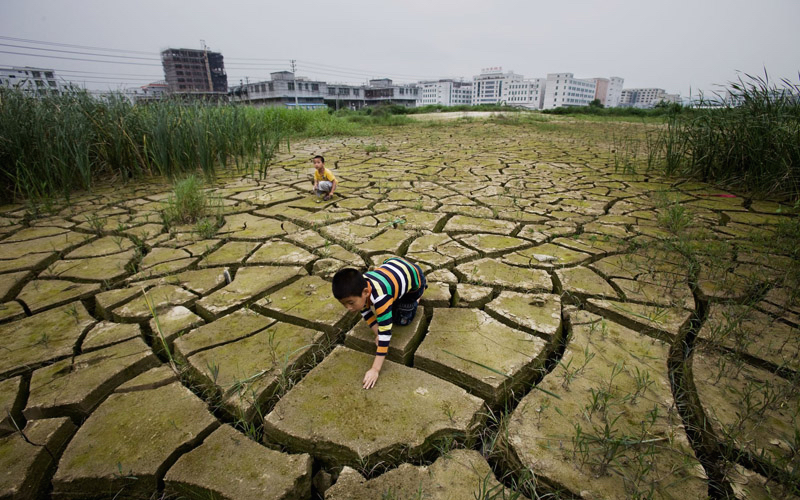
Why China’s Tougher Environmental Laws Are Likely to Fail
With the Chinese Ministry of Environmental Protection revealing that 173 Chinese steel enterprises have been breaching environmental protection laws, the Middle Kingdom’s problem with pollution and lax oversight is once again thrust into the limelight. Among the companies recently targeted is also Hongqiao, the world’s largest aluminum producer, whose Binzhou city production facilities were ordered to shut down by the local environmental protection watchdog.
As the effects of environmental degradation in China become ever more devastating, the government is cracking down. As part of its war on pollution, China just amended the country’s Environmental Protection Law (EPL) for the first time in a quarter of a century. The amendments, which will come into force in January, create higher environmental protection standards, stiffer penalties for polluters and give more powers to environmental authorities.
As part of the new legislation, business leaders who don’t complete environmental impact assessments or who fail to comply with orders to curb pollution can be detained for 15 days. Local officials found to be complicit in environmental transgressions may be demoted or fired. Violators whose actions constitute crimes will be criminally prosecuted. Pollution fines for factories – which are so low that firms often find it easier simply to pay them – will no longer be capped. Companies who violate environmental standards may have their utilities cut, their equipment destroyed, or may be shut down all together. Firms found in violation will be given six months to comply, after which they will be closed.
The main purpose of the amendments is to reduce overcapacity in the steel, coal, and cement industries, widely considered the main culprits, which have only further aggravated China’s pollution problem. The aim is to use stricter environmental standards to reduce surplus steel capacity by up to 150 million tons over the coming five years.
While many firms across China’s industrial sector are to blame for the country’s toxic air, the aluminum industry has been a particularly egregious polluter. According to reports, 62 aluminum smelters – responsible for 80% of Chinese aluminum – have violated air pollution standards, some giving off enough particulate matter to cause haze and make it difficult to breathe. Some facilities are especially bad. Xinfa’s Guangxi smelter emits 17 mg/m3 of particulate matter, almost double national legal limits, while its Shandong plant puts out 790mg/m3 of nitrogen oxide, eight times the limit. Others are so toxic that they have caused local unrest. In 2010, over 1,000 villagers in Jingxi County took to the streets to protest the spillage of red mud from an aluminum plant owned by Xinfa.
While the latest environmental protection legislation is a sign of progress, its implementation is likely to fall short. Although China’s environmental laws are relatively strong, its enforcement and implementation are weak, for a number of reasons. For one, the responsibility of environmental protection in China is assigned to multiple agencies with overlapping mandates, hindering the enforcement of environmental law. Furthermore, the Environmental Protection Law contradicts other pieces of legislation, which could lead to legal conflicts.
Another part of the problem is that most of the work of environmental protection is done locally, with the national government given limited authority. While the environment ministry can give guidance to local environmental protection bureaus, its actual power over them is meager. This is a problem because local governments are often more concerned with economic growth than with the environment, and polluting companies are often key generators of local economic activity. Since local governments control the budget and staffing of the bureaus, there is a strong incentive to ignore environmental violations for the sake of the economy.
Noncompliance by local governments and environmental bureaus has been one of the key obstacles to environmental protection in China. The recent revelations that 173 steel firms have violated environmental regulations have only further brought to light the negligence of local officials in both applying and enforcing the law. And yet, despite repeated requests from regulators to shut them down, the local government did nothing. For example, through a spokesman, Hongqiao announced it has so far refused to close its facilities or pay any fines.
Corruption also plays a role. Chinese officials have been known to take bribes from companies in exchange for ignoring violations. Last year, former Ministry of Environmental Protection (MEP) vice minister Zhang Lijun was investigated and kicked out of the Communist Party for selling fraudulent quality control certifications and for his involvement in the sale of fake monitoring equipment. While China’s anti-corruption efforts may help to stop such wrongdoings, the problem is likely to continue.
Further compounding the problem, local governments lack the resources and staff to effectively enforce environmental regulations. For example, county governments in Jiangsu province typically have only one inspector each to monitor hazardous waste disposal. Sometimes, one person will be responsible for hundreds of factories. In 2015, it was reported that the environmental protection bureau in Hebei province had only 50 people to monitor exhaust emissions, compared to 700 in Beijing. Unless local governments are allocated sufficient funds to monitor and enforce regulations, tougher mandates from the top are unlikely to have much of an effect.
To make matters worse, the environment is not the only victim of China’s massive overcapacity problem. The oversupply has caused economic harm to neighboring countries. Unable to compete with the deluge of cheap Chinese imports and the resulting price drop, many producers in the region have been forced to close.
To China’s credit, it has taken important steps to move in the right direction of environmental protection, as the recent EPL amendments show. But as long as enforcement, oversight, insubordinate local governments and structural clutter are not brought under control, China’s deadly pollution problem will not be solved.

